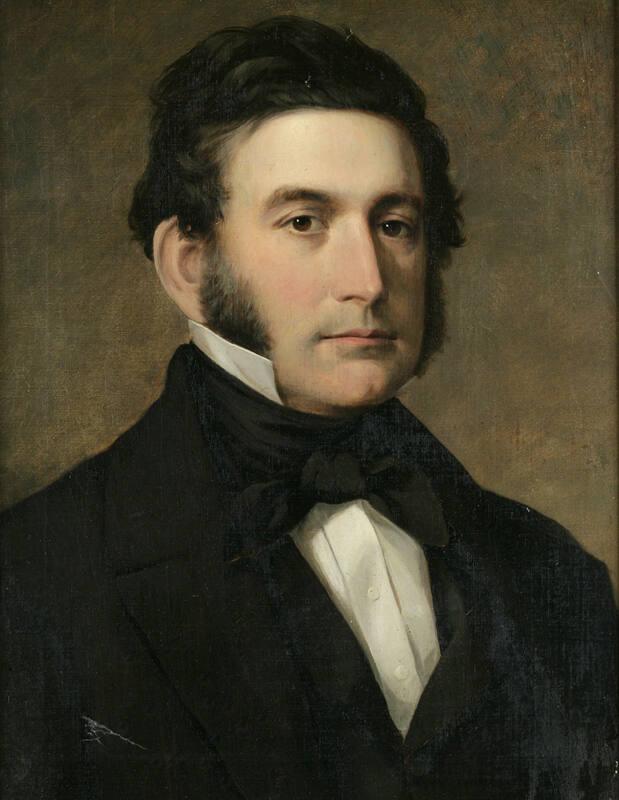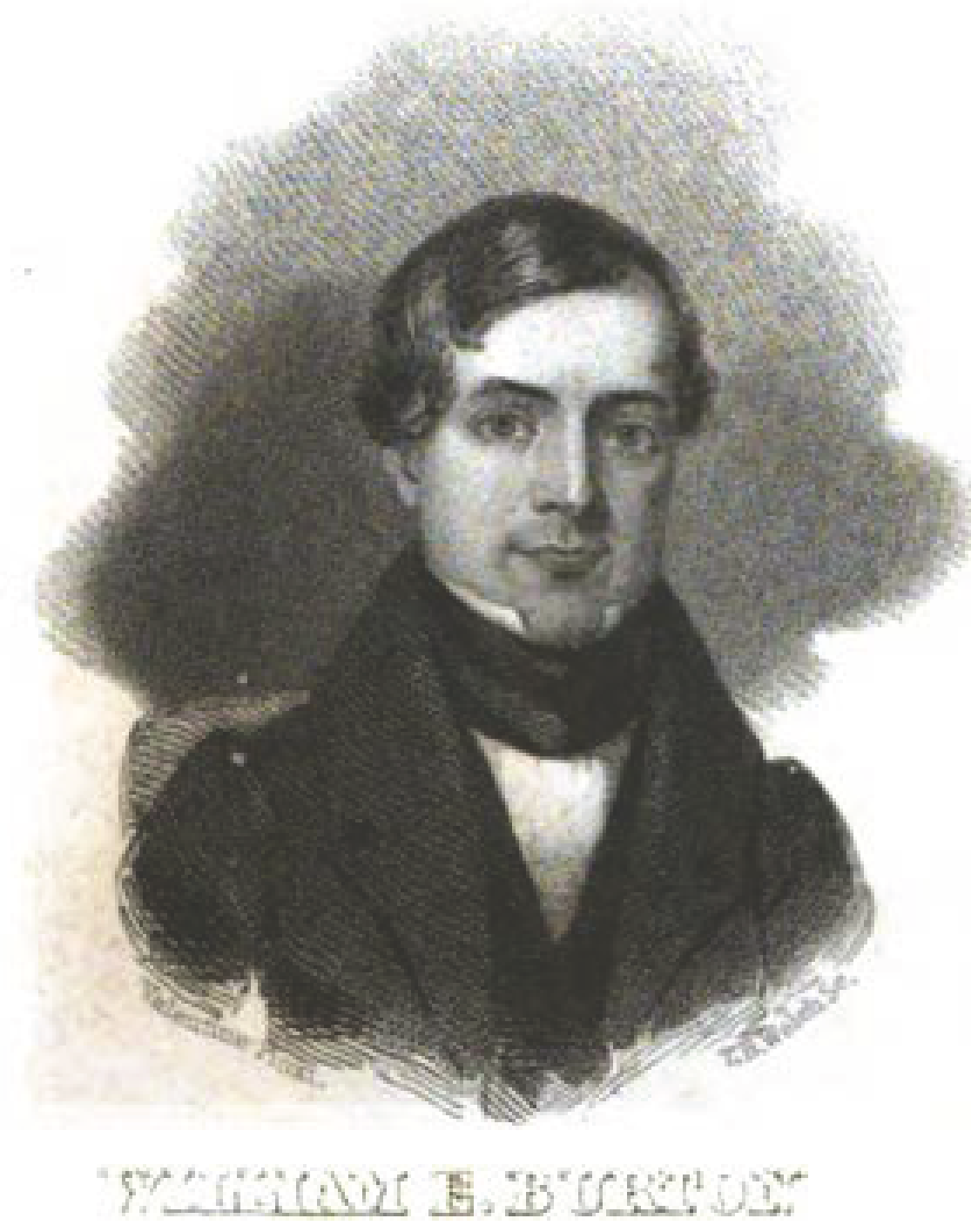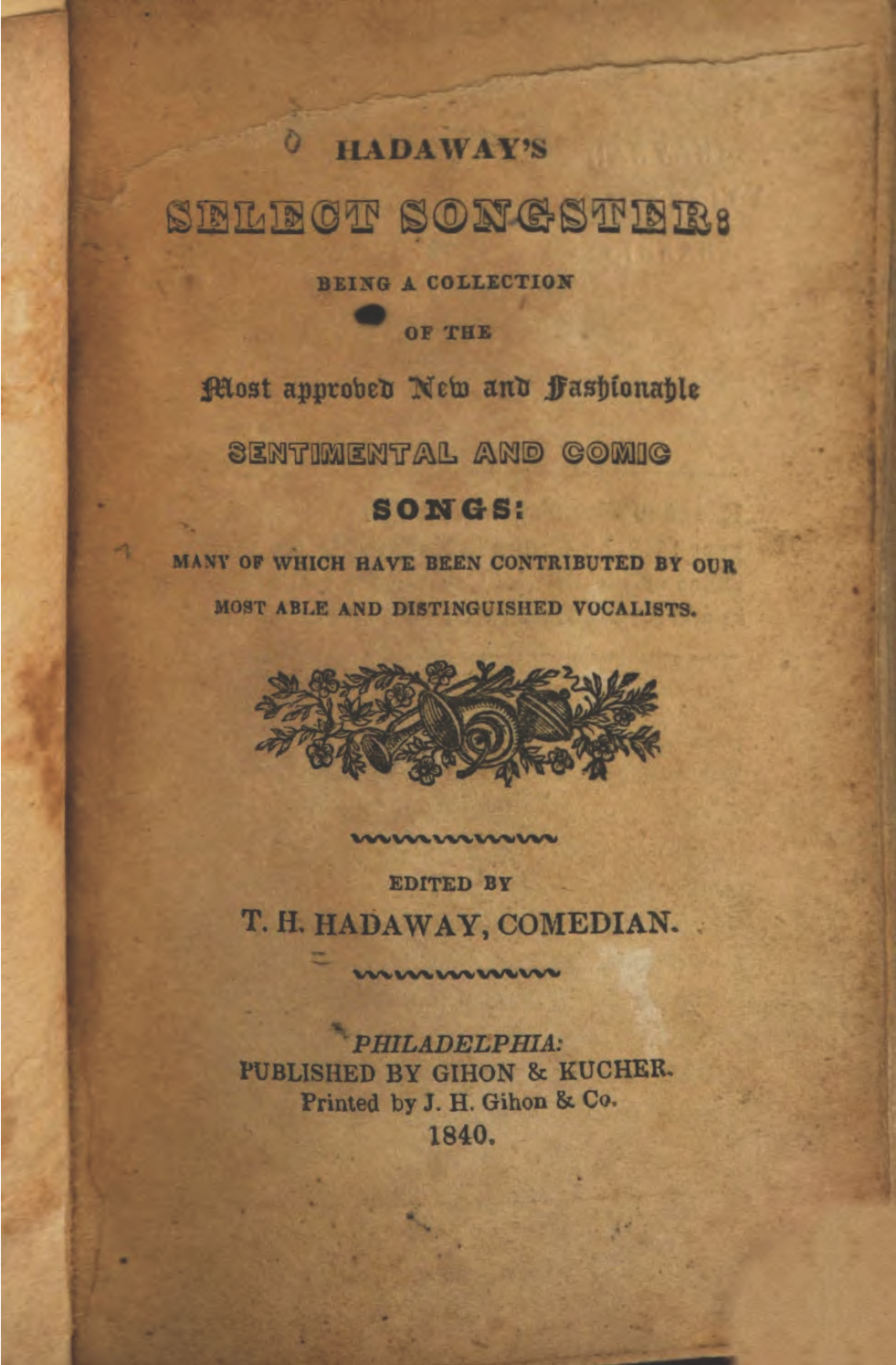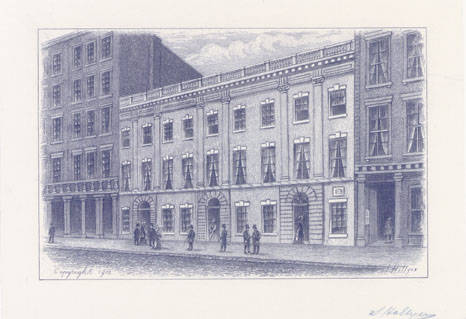William Evans Burton

William E. Burton, c. 1850-1855. Artist: Henry Peters Gray. Oil on canvas. 22 in. × 17 1/4 in. (55.9 × 43.8 cm). New-York Historical Society. https://emuseum.nyhistory.org/objects/34833/william-evans-burton-18041860. Accessed 11 April, 2022.

A younger, less jaded Burton. Image taken from frontispiece to Burton’s Comic Songster 1837 
THE CORK LEG.
Sung — by Mr. W. E. Burton. —
Air: “The West Countryman.”
A tale I tell now without any flam —
In Holland dwelt Mynheer Vonclam,
Who every morning said I am
The richest merchant in Rotterdam.
Ri too ral, &c.
One day he had stuff’d him full as an egg,
When a poor relation came to beg;
But he kick’d him out without broaching a keg,
And in kicking him out he broke his leg.
Ri too ral, &c.
A sergeon — the first in his vocation,
Came and made a long oration;
He wanted a limb for anatomization,
So he finished his job by amputation.
Ri too ral, &c.
Said Mynheer, says he, when he’d done his work,
By your sharp knife I lose one fork!
But on two crutches I never will stalk,
For I’ll have a beautiful leg of cork,
Ri too ral, &c.
An artist in Rotterdam ’twould seem,
Had made cork legs his study and theme;
Each joint was as strong as an iron beam,
The springs a compound of clock work and steam.
Ri too ral, &c.
The leg was made and fitted tight,
Inspection the artist did invite,
The fine shape gave Mynheer delight
As he fixed it on and screwed it tight.
Ri too ral, &c.
He walk’d through squares and past each shop,
Of speed he went to the utmost top;
Each step he took with a bound and a hop,
And he found his leg ha could not stop.
Ri too ral,
Horror and fright were in his face,
The neighbors thought he was running a race;
He clung to a gas lamp post to stay his pace,
But the leg wouldn’t stay, but kept on the chase.
Ri too ral, &c.
Then he call’d to some men with all his might,
“Oh, stop this leg, or I’m murdered quite!”
But though they heard him aid invite,
He in less than a minute was out of sight.
Ri too ral, &c.
He ran o’er hill and dale and plain,
To ease his weary bones he’d fain;
He threw himself down but all in vain,
The leg got up and was off again.
Ri too ral, &c.
He walk’d of days and nights a score,
Of Europe he soon made the tour;
He died — but though he was no more,
The leg walk’d on the same as before,
Ri too ral, &c.
In Holland sometimes it comes in sight,
A skeleton on a cork leg tight,
No cash did the artist’s skill requite,
He never was paid — and it served him right,
Ri too ral, &c.
My tale I’ve told both plain and free,
Of the rummest merchant that could be,
Who was never buried — though dead we see,
And I’ve been singing his L-E G !
From: Burton’s Comic Songster 1837 
Rerun by Hadaway in:

Hadaway’s select songster: being a collection of the most approved new and fashionable sentimental and comic songs: [sic]many of which have been contributed by our most able and distinguished vocalists. Edited by T. H. Hadaway, Comedian. Philadelphia; Published by Gihon & Kucher. 1840.
THE STEAM ARM.
Sung — by Mr. Burton. —
Air: “The West Countryman.”
O! WONDERS sure will never cease,
While works of art do so increase,
No matter whether in war or peace,
Men can do whatever they please.
Ri too ral, &c.
A curious tale I can unfold
To all of you, as I was told,
About a soldier stout and bold,
Whose wife, ’ tis said, was an arrant scold.
Ri too ral, &c.
At Waterloo he lost an arm,
Which gave him pain and great alarm,
But he soon got well, and grew quite calm,
For a shilling a day was a sort of balm.
Ri too ral, &c.
The story goes, on every night,
His wife would bang him left and right,
So he determined out of spite,
To have an arm, cost what it might.
Ri too ral, &c.
He went at once, strange it may seem,
To have one made to work by steam,
For a ray of a hope began to gleam,
That force of arms would win her esteem.
Ri too ral, &c.
The limb was finish’d, and fix’d unto
His stump of a shoulder, neat and true;
You’d have thought it there by nature grew,
For it stuck to its place as tight as glue.
Ri too ral, &c.
He started home, and knock’d at the door,
His wife her abuse began to pour.
He turn’d a small peg, and before
She’d time to think, she fell on the floor.
Ri too ral, &c.
With policemen soon the place was fill’d,
But every one he nearly kill’d;
For the soldier’s arm had been so drill’d,
That once in action it couldn’t be still’d.
Ri too ral, &c.
They took him at once before the mayor,
His arm kept moving all the while there,
The mayor cried, ’Shake your fist, if you dare,’
Then the steam arm knock’d him out of his chair.
Ri too ral, &c.
This raised in court a bit of a clamor,
The arm going like an auctioneer’s hammer,
It fell in weight like a pavior’s rammer,
And many with fear began to stammer.
Ri too ral, &c.
He was lock’d in a cell, from doing harm,
To satisfy them who had still a qualm,
When all at once they had an alarm,
Down fell the walls, and out popp’d the arm.
Ri too ral, &c.
He soon escaped, and reach’d his door,
And knock’d by steam raps half a score,
But as the arm in power grew more and more,
Bricks, mortar, and wood soon strew’d the floor.
Ri too ral, &c.
With eagerness he stepp’d each stair,
Popp’d into the room, his wife was there,
“ O come to my arms,” she cried, my dear,”
When his steamer smash’d the crockery ware.
Ri too ral, &c.
He left his house at length outright,
And wanders about just like a sprite,
For he can’t get asleep either day or night,
And his arm keeps moving with a two-horse might.
Ri too ral, &c.
RELATED
H.V. Smith, The Steam Arm [sheet music] 1835? 
H.V. Smith, Steam! Steam!! Steam!!! [sheet music] 1835? 
THE NERVOUS FAMILY.
WITH ADDITIONAL VERSES.
Sung — by Mr. Burton in character. —
WE’RE all nervous, shake, shake, trembling,
We’re all nervous at our house in town.
Myself, and my wife, my sister, and my mother,
If left in the dark are all frighten’d at each other;
Our dog runs away if a stranger’s in the house,
And our great tabby cat too is frighten’d at a mouse.
And we’re all nervous, &c.
My nervous wife can’t work at her needle,
And my shaking hand spills half my cup of tea;
When wine at her dinner my timid sister’s taking,
Its spilt on the table for so her hand is shaking;
My mother taking snuff very carefully doth try,
To pop it up her nose, but she pops it in her eye.
For she is so nervous, &c.
We all at dinner shake, shake at carving,
And as for snuffing, we oft snuff out the light.
Last night every one did to snuff the candle try,
But my wife couldn’t do it, nor my sister, nor could I.
Come, give me the snuffers, said my mother with a flout,
I’ll show you how to do it, and she did, and snuff’d it
out.
For she is so nervous, &c.
Our nerves foretell all the changes of the weather,
We’re so nervous we’re frighten’d at each noise;
We’ve got a watchman to guard the private door,
But since we have had him we’ve been frighten’d more and more;
For he falls asleep, and we’ve found out too that he,
In respect to his nerves, O, he’s quite as bad as me.
For the watchman’s nervous, &c.
The mania’s spreading through the house like wild fire,
And all the servants in fear walk about,
As if they’d the ague or some other sort of ill,
They won’t move about, though they cannot stand still,
Nor answer the door to a knock if late at night,
For fear that a robber should kill them all with
fright.
For we’re all nervous, & c,
If you, like us, are any way nervous,
I hope you won’t laugh, but will pity our sad case;
Nervous cordials we have taken, and every kind of pills,
And our money all goes now in paying doctor’s bills.
Still we take their advice, and their stuff, and keep
a nurse,
But instead of getting better, 0, we all get and worse.
And we’re all nervous, &c.
ENCORE VERSES.
Our doctor sends us a great deal of medicine,
To strengthen our nerves, but still they’re very weak;
What’s worse in a law suit we’re over head and ears,
And of course for its consequence we all have got our fears:
Our counsel to comfort says our cause has not a flaw,
Which we think may be true, but you all know what is law.
For it makes one nervous, &c.
Last night as I was dozing, soft dreams around me hovering,
A score of cats in vocal concert dire began to scream,
They “moll-row’d,” and spit, and swore, each louder than the other,
I took the broom, and open’d wide the window in a bother;
I cried, “whish, cats, get out,” but the cold wind made me cough,
And a large fierce Thomas cat just claw’d, and took my night cap off.
For we’re all nervous, &c.
I don’t know how it is, but I’m not quite so trembling,
Nor nervous here as at our house in town;
Is it caused by the company who’ve driven away thinking,
Or drinking good wine that my spirits are not sinking?
I now feel so hearty that a giant I disdain,
And I really do not care if I ne’er go home again.
For they’re all nervous, &c.

Burton purchases Palmo’s Opera House on Chambers Street, New-York in 1848. Samuel Hollyer, ca. 1910. 12x17 1/2 cm engraving. Signed proof.
RELATED
Newspaper advertisement (April 26, 1839, Public Ledger. [Philadelphia]) for Mr. Hadaway’s benefit, featuring Burton’s performance of “The Cork Leg” 